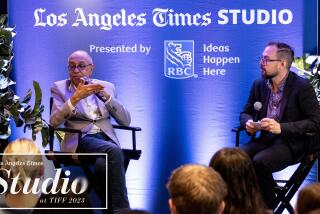John Baer; Escaped Nazis, Practiced International Law
- Share via
As you go through life, brother,
whatever be your goal, keep your eye upon the doughnut and not upon the hole.
--Mural at Pig’N Whistle
Coffee Shop circa 1945
*
That folksy, upbeat adage has inspired many. But one might not expect it to become the motto of choice for an urbane, dapper lawyer proficient in 10 languages, at ease on four continents, and expert in international law and commerce, who represented more than a dozen foreign consulates and was decorated by four nations.
It was.
“This philosophy expresses my own thinking and approach to life,” John J. Baer wrote in “Witness for a Generation,” his 1997 autobiography. “If you permit yourself to be overwhelmed by problems and disappointments, you will remain a prisoner of your own fears. However, if you decide to count your blessings and consider your problems as challenges, you will fill your life with meaning and a sense of fulfillment.”
Baer, who narrowly escaped the Nazi incarceration that killed his father and who came to be a Los Angeles lawyer by a long and circuitous route, died March 3 at his home in Los Angeles. He was 83.
“It is the passing of a truly great man,” said Norway Consul General Richard Fine. “He just radiated a special, wonderful warmth.”
Baer ended his career as a respected Century City lawyer handling international law and trade issues for the Los Angeles consulates, not only of Norway, but also of Germany, Austria, France, Belgium, the Netherlands, Denmark, Spain, Canada, Australia, New Zealand, Italy, Sweden and Finland.
Among his clients had been Italian Maestro Carlo Maria Giulini, whose contract he negotiated to conduct the Los Angeles Philharmonic, and film director John Huston, for whom he made international motion picture deals.
But Baer was 40 when he finally got his law degree by correspondence from La Salle Extension University in Chicago and passed the California Bar. And he was 45 when he decided to practice law full time.
When he spotted the homespun adage on the wall of the Pig’N Whistle in 1945, he was a newly immigrated 28-year-old with a wife and child and a low-paying job at Union Bank.
Born April 26, 1917, in Breslau, Germany, Baer grew up in a comfortable home, belonged to a Boy Scout troop, attended the Jewish Theological Seminary with thoughts of becoming a rabbi, and then switched to Breslau University. In addition to his native German, he mastered Latin, French, Greek, English, Hebrew, Polish, Spanish, Italian and, years later, Japanese.
But he also studied philosophy, Talmudic law, literature and history and was keenly attentive to rapidly changing German politics.
Baer watched Nazis stand in front of his mother’s millinery shop on “Boycott Day”--April 1, 1933--with signs stating “Don’t Buy From Jews.”
On Nov. 9, 1938, he also saw the destruction of his synagogue and several businesses on what became known as “Kristallnacht.” His father was arrested the next day and imprisoned at Buchenwald, where he died, fellow prisoners said, after collapsing from fatigue and being beaten by SS guards. German authorities attributed his death to a heart attack.
Baer escaped arrest only because he and his brother-in-law fled to Berlin. When he returned, two weeks later, he had been banished from Breslau University. It was time to leave Germany.
After overcoming labyrinthine problems--obtaining a valid passport, visas, recommendations for work and train and steamship tickets amid escalating restrictions on Jews--by year’s end Baer was on a Chilean vessel en route to his first expatriate home, in Arequipa, Peru.
A few months later, he relocated to La Paz, Bolivia, where it was easier to get visas for his fiancee, Ursula, her parents and his mother to join him.
Baer made a living as an interpreter and translator of Spanish and English for various immigrants and import-export firms.
By 1941, he had a job as economic advisor and interpreter-translator for the American ambassador in La Paz--which proved to be his ticket to the United States.
The family left Bolivia April 26, 1945--Baer’s 28th birthday--and spent two months wending their way via Chile, Peru and Ecuador to the United States and, eventually, Los Angeles. Baer’s odyssey was over.
Again he found work in translation and foreign trade correspondence for banks and businesses, taught Spanish in adult school and, eventually, fulfilled a dream to study law.
He was elected president of the Foreign Trade Assn. of Southern California and was active in the Los Angeles County Bar Assn. He was a founder of the American Israel Chamber of Commerce, active with the Los Angeles Jewish Home for the Aging, the Jewish Club of 1933 and Wilshire Boulevard Temple.
Widowed in 1989 by the death of Ursula, his wife of 50 years, Baer is survived by his second wife, Birgitta; two daughters, Gabriela Litov and Leslie Cole; stepdaughter Anna Wohl; five grandchildren; and two great-grandchildren.
The family has asked that memorial donations be made to the Los Angeles Jewish Home for the Aging, the Hadassah Hospital in Israel or to any other Jewish charity.
More to Read
Sign up for The Wild
We’ll help you find the best places to hike, bike and run, as well as the perfect silent spots for meditation and yoga.
You may occasionally receive promotional content from the Los Angeles Times.






